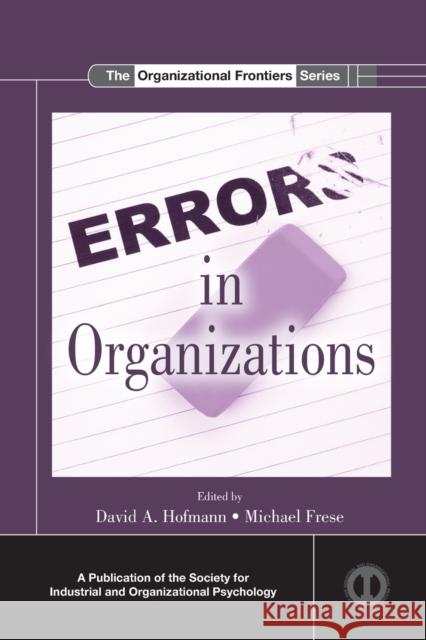Errors in Organizations » książka



Errors in Organizations
ISBN-13: 9780815390855 / Angielski / Miękka / 2017 / 384 str.
Errors in Organizations
ISBN-13: 9780815390855 / Angielski / Miękka / 2017 / 384 str.
(netto: 245,45 VAT: 5%)
Najniższa cena z 30 dni: 236,70
ok. 30 dni roboczych.
Darmowa dostawa!
E. Salas, Series Foreword. D.A. Hofmann, M. Frese, Introduction: Errors, Error Taxonomies, Error Prevention and Error Management: Laying the Groundwork for Discussing Errors in Organizations. N. Keith, Learning through Errors in Training. M. Hammond, J. Farr, The Role of Errors in the Creative and Innovative Process. S. Mousavi, G. Gigerenzer, Revisiting the ‘Error’ in Studies of Cognitive Errors. B. Bell, S.W.J. Kozlowski, Cognitive Failure: The Emergence, Consequences, and Management of Errors in Teams. E. Salas, S.J. Weaver, W.L. Bedwell, Team Training as a Mechanism to Enhance Reliability and Manage Errors. L.H. MacPhail, A. Edmondson, The Importance of Work Context in Organizational Learning from Error. K. Shimizu, M.A. Hitt, Errors at the Top of the Hierarchy. E. Hollnagel, When Things Go Wrong: Failures as the Flip Side of Successes. R. Ramanujam, P. Goodman, The Link between Organizational Errors and Adverse Consequences: The Role of Error-Correcting and Error-Amplifying Feedback Processes. M.J. Gelfand, M. Frese, Cultural Influences on Error: Prevention, Detection, and Management. M. Frese, D.A. Hofmann, Conclusions and Integration.
David Hofmann is Area Chair and Professor of Organizational Behavior at the University of North Carolina at Chapel Hill’s Kenan-Flagler Business School. His research - focused on leadership, organizational climate, multi-level theory/methods, safety and human error - has appeared in Academy of Management Journal, Academy of Management Review, Journal of Applied Psychology, Journal of Management, Organizational Behavior and Human Decision Processes, and Personnel Psychology and other outlets. He teaches courses in organizational behavior and leadership and was formerly the Associate Dean for the full-time MBA program. David’s research on leadership, safety and human error in organizations led to a corporate partnership with Behavioral Science Technologies where he helped develop a cultural assessment tool that has now been completed by over 200,000 employees in 1,000 companies (including all NASA employees after the Columbia accident). In 2006, he was awarded the American Psychological Association’s Decade of Behavior Research Award. The APA honored the practical application of his research investigating leadership issues in high-risk industries, and he presented his findings at a Congressional briefing. Dr. Hofmann also received the Yoder-Heneman Research award from the Society of Human Resource Management and has been a Fulbright Senior Scholar. Currently, he is a member of the National Research Council / National Academy of Science’s committee investigating the BP Deepwater Horizon accident. He earned his PhD in industrial and organizational psychology from Pennsylvania State University, a master's degree in industrial and organizational psychology from the University of Central Florida and a bachelor's degree in business administration from Furman University. Prof. Dr. Michael Frese received his Diploma and Doctorate from the Free University of Berlin and Technical University Berlin respectively and holds a joint appointment at National University of Singapore, Business School and Leuphana University of Lueneburg (Germany). Before that, he held a chair for work and organizational psychology at University of Giessen and also taught at London Business School. Prof. Frese’s research spans a wide range of basic and applied topics within organizational behavior and work psychology. Most important are his longitudinal studies on psychological effects of unemployment, impact of stress at work, predictors of personal initiative, as well as psychological success factors of entrepreneurs. He is also known for his cross-national research on innovation. His field studies on errors, error management, error management culture also have received wide attention. In addition he is studying training - most importantly the concept of error management training, leadership training and psychological training for increasing entrepreneurial success and personal initiative. Most recently, he has done studies on cultural factors in organization and across nations, research that looks at psychological success factors in entrepreneurs in developing countries (Africa, Latin America, and Asia) and in Europe. Frese has authored more than 250 articles and was editor/author of more than 20 books and special issues. He was elected Fellow of the Society for Industrial and Organizational Psychology (Division 14 of the American Psychological Association). He is Germany’s most frequently cited work and organizational psychologist and business and management scientist and one of the most frequently cited Europeans. He has presented more than 25 invited keynote addresses. Prof. Frese now serves as field editor for Journal of Business Venturing. He was President of the International Association of Applied Psychology, editor of the journal APPLIED PSYCHOLOGY: An International Review, Co-Editor of Psychologische Rundschau, editorial board member of various book series (Entrepreneurship Series in Germany, SIOP Frontiers book series, Organization and Management Series (Routledge)) and member of several boards of journals. He also serves as consultant and lecturer to the management of many companies (among others banks, technology firms, automobile, utilities, telecommunication, and computer industry, with more than 200 talks given and consulting jobs done).
1997-2026 DolnySlask.com Agencja Internetowa
KrainaKsiazek.PL - Księgarnia Internetowa









